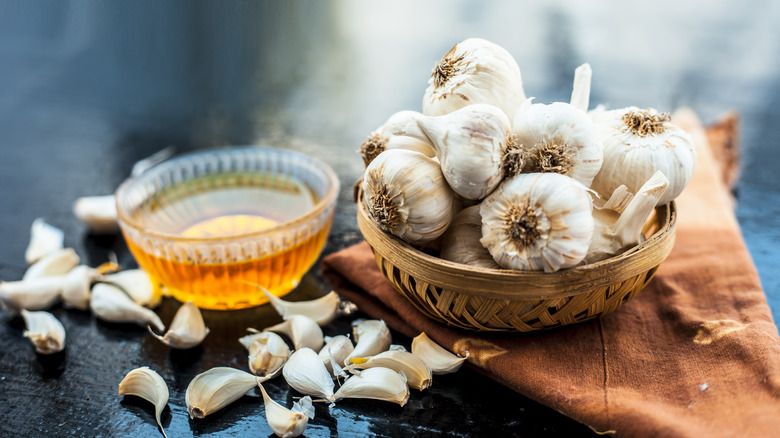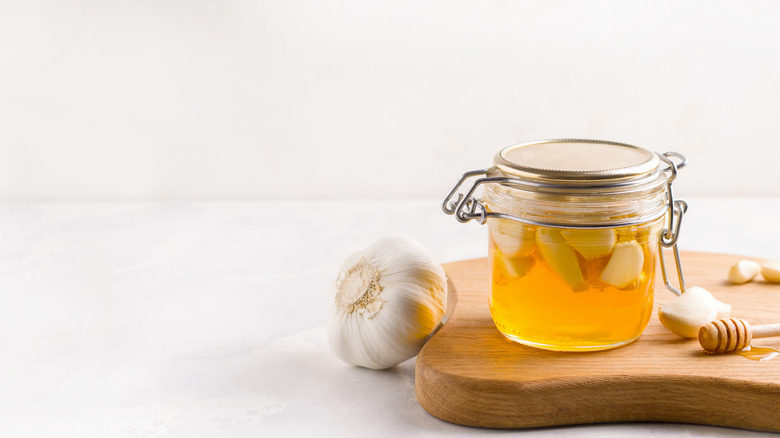Fermented Garlic Honey Deserves A Spot In Your Kitchen. Here's Why
Everybody has their non-pharmaceutical home remedies for bumps, lumps, and flu. Maybe your grandma used to rub banana peels on your poison ivy rash, or perhaps you've tried the old duct tape-on-your-warts trick. While some of these home remedies are more effective than others, the immune-boosting properties of fermented garlic honey could make it your new secret weapon during the colder months. Sure, it's easy to dismiss fermented garlic honey as yet another mythical cure-all, but there is some evidence that says this combo works — and it's dead simple to make.
It's more or less known that fermented foods provide multiple health benefits to those who enjoy them. But when you combine the antibacterial properties of garlic with the antiviral properties of honey, this lively concoction will make your sense of well-being noticeably better. It doesn't mean that you won't get sick once this cold and flu season, but it's a solid defense –- and a pretty tasty one to boot.
Health benefits of garlic and honey
Garlic has been shown to reduce the prevalence of cold viruses, either helping to prevent illness entirely or helping people recover much more quickly than those who don't consume it. According to Healthline, it's also great for cardiovascular health by helping lower cholesterol, lowering blood pressure, and can support cognitive function by way of antioxidants, among many of its benefits. Garlic is full of a compound called allicin, which may lower the amount of heavy metals in the blood. Allicin is unstable, only becomes available once garlic cloves are crushed or chopped, and dissipates quickly. There's contradictory evidence about whether fermentation might decrease allicin levels in garlic. Still, garlic's health benefits are numerous.
Honey is also no slouch when it comes to nutritional benefits – it's a food that never expires for a reason. As Healthline says, honey is full of antioxidants and flavonoids that make it great for preventing cellular damage associated with aging. Some types of honey (like Manuka) are antimicrobial and can help heal wounds like burns and ulcers. If you get a cold, honey can help suppress coughing and soothe your throat. Now imagine honey packed with garlicky magic — that's a lot of firepower!
Tips for making fermented garlic honey
When making fermented garlic honey, first and foremost, you must work with sterile tools and jars. It's important to inhibit mold and bacterial growth during the fermentation process. (It's not complicated: Just pour boiling water in your jar to kill any lingering bacteria before filling it.) It's important to keep your fermenting garlic honey at room temperature for three or four weeks; storing it in the fridge may ruin fermentation. Be sure that every clove is completely submerged in honey, less you run the risk of contamination. As your garlic honey ferments, it will become thinner in consistency, and during the process, you will see little bubbles — this is how you know your garlic honey is thriving. It's also important to release the gas, or "burp" the honey, periodically to make sure your jar doesn't explode. Once your honey doesn't require burping, you'll know it's ready to enjoy.
When it's time to consume the fermented garlic honey, you can simply eat a spoonful as often as you like. Alternatively, you can enjoy this potion in a mug of tea — just add as much as you would to sweeten your tea normally, and enjoy a little extra boost from the fermented garlic. You can incorporate fermented garlic honey into salad dressings or drizzle on your morning toast. Anywhere you'd use regular honey, you can sub in this magical elixir.


